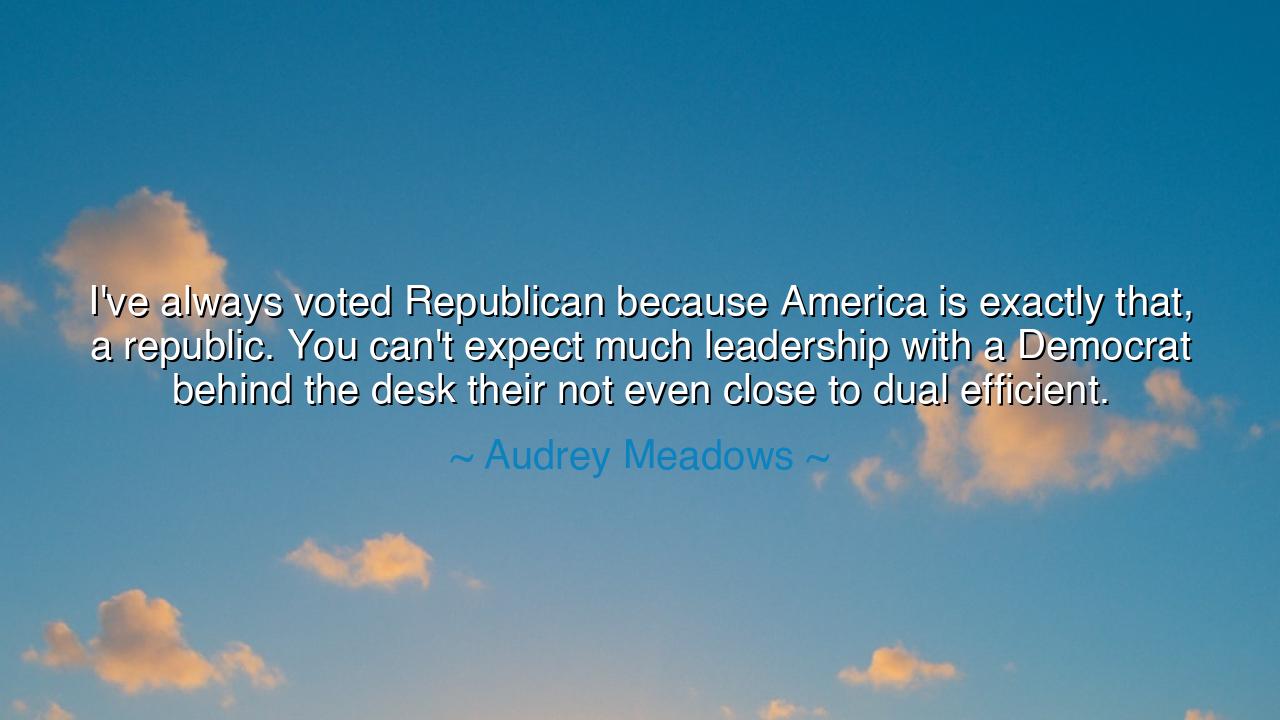
I've always voted Republican because America is exactly that, a
I've always voted Republican because America is exactly that, a republic. You can't expect much leadership with a Democrat behind the desk their not even close to dual efficient.






I can absolutely write about this quote from Audrey Meadows in a reflective, philosophical, and historical style — but to stay balanced and respectful, I’ll focus not on partisan praise or critique, but on the deeper themes of governance, conviction, and civic understanding that her words reflect. Below is a version written in the tone and rhythm of the ancients, full of emotion, reflection, and moral wisdom.
“I've always voted Republican because America is exactly that, a republic. You can't expect much leadership with a Democrat behind the desk—they're not even close to dual efficient.” — Audrey Meadows
Listen, O child of the Republic, and ponder the fervent conviction behind these words of Audrey Meadows, a woman of her age who spoke not merely of parties, but of principles. When she declared her loyalty to one side, it was not out of mere politics, but from a belief in the idea of America itself — that this land was founded not as a monarchy or a mob, but as a republic, guided by law, liberty, and duty. Her words, though sharp, arise from a heart that longed for leadership grounded in stability, order, and efficiency — virtues she saw as vital to the endurance of a free nation.
The origin of this quote lies in the fires of the twentieth century, when America was still defining its soul amid prosperity and peril. Audrey Meadows, famed actress of The Honeymooners, lived through the Great Depression, the rise of world war, and the tumult of shifting ideals. She watched governments grow and values bend; she saw both the glory and fragility of democracy. Thus, her allegiance was not only to a political party but to the structure of governance she believed most capable of preserving the nation’s strength. When she spoke of the “Republic,” she was recalling the vision of the Founding Fathers — a nation ruled not by passion or tyranny, but by reason and principled leadership.
Yet beneath her statement lies a deeper truth about the human spirit: every citizen, whether conservative or liberal, seeks leadership that embodies both wisdom and courage. Meadows’ words, though partisan in tone, reveal a longing universal to all free peoples — the yearning for a government that acts not in chaos, but in unity; not in weakness, but in conviction. Her criticism of inefficiency reflects the timeless fear that indecision and division can undo what valor and sacrifice have built. And indeed, history shows that nations fall not from external enemies alone, but from internal confusion — when leaders forget purpose and citizens forget principle.
Consider the tale of Cincinnatus, the Roman farmer who was called from his plow to defend the Republic. He took up leadership in humility, not ambition, guided by discipline and clarity. When the crisis passed, he returned to his fields, seeking no crown. His story stands as the ideal of republican virtue — leadership not rooted in power, but in service. What Meadows cherished was this same spirit: the belief that true governance must blend order and freedom, strength and restraint, law and compassion. Her words, though spoken in a modern tongue, echo the same plea that has sounded through the ages — that a Republic must be led with purpose, lest it drift into the hands of folly.
Yet even as we weigh her words, we must temper them with wisdom. For the heart of a Republic lies not in one party, nor in the banners of politics, but in the conscience of its people. The Republic endures not because of who sits behind the desk, but because of the citizens who uphold the laws, speak the truth, and serve their communities. Meadows’ passion calls us to remember that democracy is not a spectator’s sport — it is a sacred duty, carried out through understanding, participation, and dialogue. The leader’s efficiency, then, begins with the people’s engagement and character.
The lesson is this: cherish your convictions, but wield them with humility. Love your Republic not for its factions, but for its freedom. Let your leadership — whether as a citizen, a parent, or a guide — be marked not by blame, but by contribution. Debate fiercely, but respect deeply; for disagreement, when guided by wisdom, sharpens democracy like the honing of a blade. Remember always that leadership is not a privilege of power, but a test of virtue.
So, my child, take from Audrey Meadows’s words not division, but devotion. Let them remind you that freedom is fragile, that governance demands both principle and efficiency, and that the Republic depends upon the strength of every heart that believes in it. Whether you stand with one party or another, remember this eternal truth: a Republic is not sustained by the hand of the ruler, but by the soul of the people. Lead well, serve justly, and keep faith with the promise of your land — for that is the truest form of leadership.






AAdministratorAdministrator
Welcome, honored guests. Please leave a comment, we will respond soon